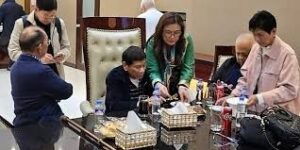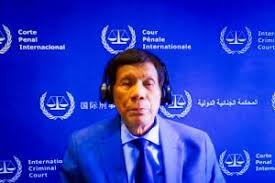The hallowed halls of the International Criminal Court (ICC) in The Hague are currently hosting a pivotal legal drama that cuts to the core of international justice: the question of a high-profile suspect’s capacity to stand trial. In a move underscoring the complexities of prosecuting global leaders for mass atrocities, the ICC’s Pre-Trial Chamber I has formally ordered an independent, high-level medical examination of former Philippine President Rodrigo Duterte. This directive seeks to definitively determine if the 80-year-old former leader is medically and cognitively fit to participate in the proceedings against him, where he faces charges of crimes against humanity linked to his notorious “war on drugs.”

This development places a temporary, yet profound, pause on the judicial process, highlighting the fundamental tension between a robust pursuit of accountability for serious crimes and the inviolable right of a suspect to a fair trial, which mandates meaningful participation. The outcome of this medical assessment is not merely a clinical finding; it is a critical legal threshold that will dictate the future trajectory of one of the ICC’s most politically charged cases.
The Legal Framework: Fitness to Proceed at the ICC
The court’s decision, outlined in a ruling released this week, is a clear assertion of its commitment to both justice and due process. It follows a direct request from Duterte’s defense team for an indefinite postponement of the proceedings, a plea arguing that the former President is currently “unfit for trial” due to a deteriorating cognitive state.
To address this challenge, the Pre-Trial Chamber I has established a highly specialized, three-member panel of medical experts. This panel is intentionally multidisciplinary, consisting of a forensic psychiatrist, a neuropsychologist, and a geriatric behavioral psychologist. The composition of this team reflects the nuance of the inquiry: it is not simply about physical health, but about the specific cognitive and psychological impairments that can affect a person of advanced age facing extreme legal pressure. Their joint report is due by October 31, 2025, with the prosecution, defense, and victims’ counsels directed to submit their formal comments shortly thereafter, by November 5.
Crucially, the ICC ruling reiterated the established principle of international criminal law that fitness to stand trial is ultimately a legal question, not solely a medical one. The presence of a medical condition is only the starting point. The court must ascertain whether any condition impairs the accused’s ability to:
-
Understand the nature and object of the proceedings against him.
Effectively exercise his legal rights, including instructing counsel.
Meaningfully participate in the proceedings, notably the critical confirmation of charges hearing.
The chamber’s mandate to the expert panel is therefore highly specific. It demands an evaluation of whether any condition might “impair his ability to follow or engage in the pre-trial proceedings,” and to recommend any “special measures or adjustments” required to accommodate his medical prognosis, should he be deemed fit to proceed. This emphasis on “meaningful participation” ensures the process adheres to the highest standards of fairness, even for an individual accused of the gravest crimes.
The Defense’s Claim: Cognitive Impairment and Unfitness
The defense, led by Israeli lawyer Nicholas Kaufman, has staked a considerable part of its strategy on the assertion of Duterte’s cognitive decline. According to the defense team’s filings, the 80-year-old former leader is experiencing significant health challenges that render him unable to assist meaningfully in his own defense.
Specifically, the claims include documented instances of memory lapses, pronounced difficulty recalling specific events and locations pertinent to the charges, and even occasional confusion regarding members of his close family. These alleged symptoms point toward a potential neurocognitive disorder that, if severe enough, would indeed prevent him from providing the detailed, coherent instructions necessary for his lawyers to mount an effective defense. Given the scale and complexity of the alleged crimes—spanning his tenure both as Davao City mayor and President of the Philippines—the requirement for clear communication with counsel is paramount.
In response to the defense’s forceful arguments, the ICC had previously deferred the confirmation of charges hearing, which was originally slated for September 23. This postponement was a necessary procedural step, acknowledging that the legal machine cannot move forward until the core question of the suspect’s competence is resolved. The confirmation hearing, where the prosecution formally presents the evidence to justify a full trial, represents a crucial juncture, and an unfit defendant cannot legally face this scrutiny.
The Weight of the Charges: War on Drugs and Crimes Against Humanity

The backdrop to this medical inquiry is the heavy gravity of the charges themselves. Former President Duterte is currently held in detention, facing three counts of crimes against humanity for murder and attempted murder. These charges stem from the systematic and widespread killings committed during the government’s anti-drug campaign, a policy that Duterte championed fiercely throughout his political career.
The indictment covers thousands of deaths that occurred during his presidential tenure, as well as alleged extrajudicial killings during his earlier years as the long-serving mayor of Davao City, where critics allege the precursor to his national campaign, the Davao Death Squad, operated. The ICC’s case centers on the allegation that the killings were not random acts of criminality but part of a state policy intended to “neutralize” alleged criminals, resulting in a climate of impunity and the systematic targeting of mostly poor and vulnerable Filipinos.
For the victims and their families, who have waited years for international justice after exhausting domestic avenues, the medical examination is a source of mixed emotions. While they remain committed to the court process, any suggestion of an indefinite adjournment or dismissal based on unfitness is seen as a potential denial of accountability for the thousands of lives lost. Legal advocates for the victims are closely monitoring the process to ensure that the defense’s claims are substantiated by independent, impartial evidence and not simply employed as a delaying tactic.
Conclusion: A Precedent for International Justice
The ICC’s ordered medical assessment of Rodrigo Duterte is more than a simple health check; it is a significant procedural moment with implications that could ripple far beyond The Hague. It underscores the rigorous legal and ethical demands placed on international criminal tribunals when dealing with elderly suspects facing complex charges.
If the multidisciplinary panel finds the former President fit for trial, the case will move forward to the confirmation of charges hearing. If, however, the experts determine that his cognitive impairment is substantial and irreversible, the court will face the difficult decision of how to proceed under its rules—likely an indefinite but periodic adjournment and review, rather than a dismissal of the charges.
The eyes of the international community, and especially the Philippines, will remain fixed on the proceedings. The final report from the forensic experts will not only seal Duterte’s fate but will also contribute new jurisprudence to the evolving standard of “fitness to stand trial” in the context of grave international crimes. The need for justice for the victims of the drug war remains pressing, making the integrity and impartiality of this medical assessment a crucial determinant in the final pursuit of accountability.





